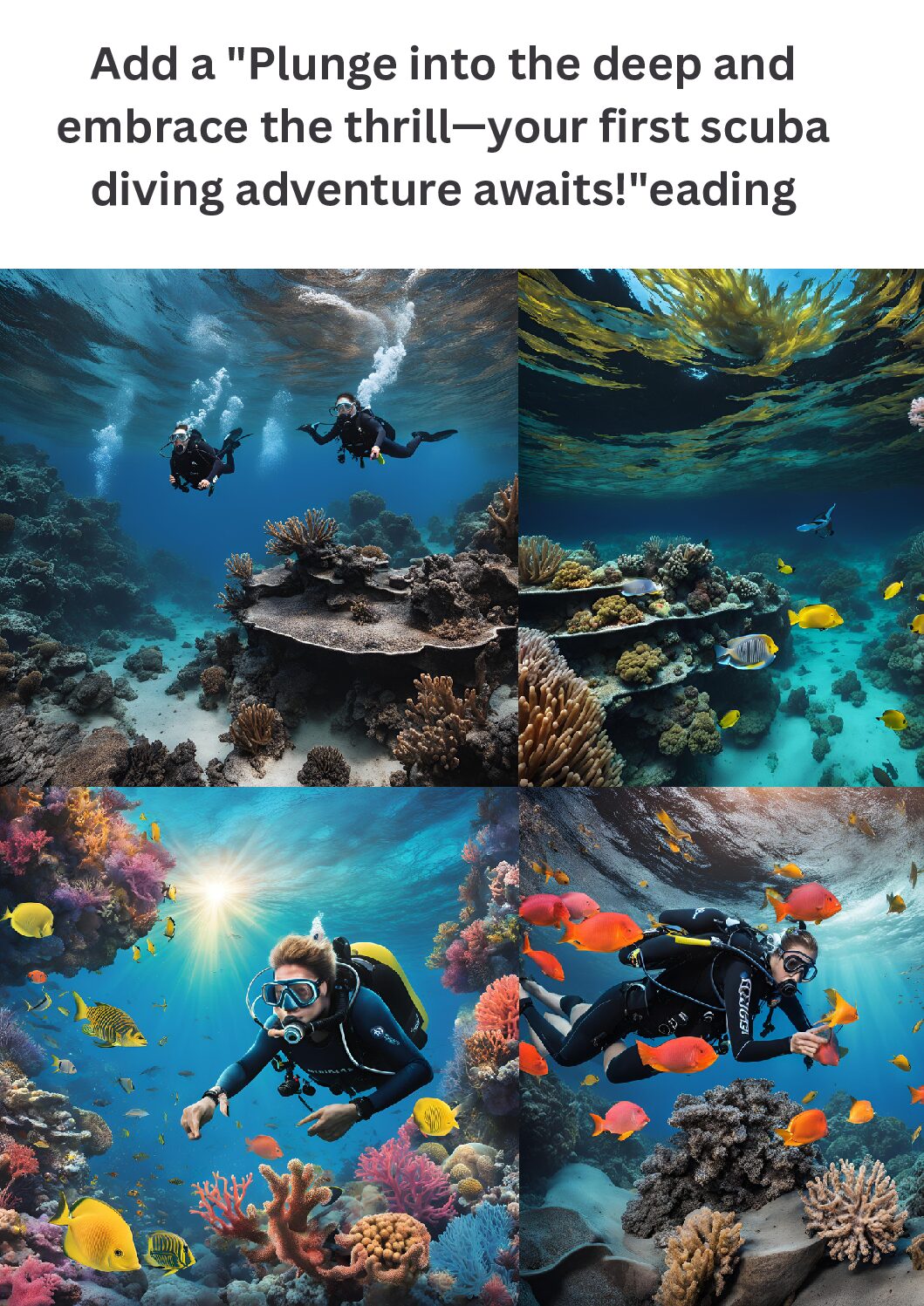Get Ready for Your First Scuba Diving Adventure: Dive Into Adventure
Exploring the underwater world through scuba diving is a fascinating experience, but for novices, the thought of plunging into the unknown may be both thrilling and frightening. Being well-prepared is essential whether your desire is to swim among vibrant coral reefs or explore enigmatic shipwrecks. This thorough guide will help you get the most out of your first time scuba diving!
1. Get Certified Before You Go.
Before you may dive into the deep blue, you must have suitable certification.
Choose a Reputable Course: Organizations such as PADI (Professional Association of Diving Instructors) and SSI (Scuba Schools International) provide beginner-friendly courses around the world.
What To Expect: Classroom training, pool practice, and open-water dives are all included in the courses, which teach you important skills including breathing methods, buoyancy control, and safety regulations.
Pro Tip: Get your certification locally before your vacation, or choose a referral program that includes classroom and pool training at home and open-water dives at your location.
2. Research Your Destination
Every dive spot has unique features, so it’s crucial to choose one that matches your skill level.
- Beginner-Friendly Destinations: Look for calm waters, good visibility, and accessible dive sites. Popular spots include the Great Barrier Reef (Australia), Koh Tao (Thailand), and Bonaire (Caribbean).
- Know the Conditions: Check water temperature, marine life, and potential currents before heading out.
3. Pack the essentials.
While most dive shops provide equipment, bringing your own items might improve your comfort and safety.
- Must-Have Items
A properly fitting mask
Snorkel Dive fins
Reef-safe sunscreen
Optional Gear: If you intend to dive frequently, consider investing in your own wetsuit or dive computer.
Tip: Bring a waterproof bag for your belongings and a microfiber towel for easy drying.
4. Stay Fit for Diving
Scuba diving requires physical fitness and mental preparedness.
-
- Get Active: Build stamina with regular cardio workouts like swimming or jogging to improve your underwater endurance.
- Practice Breathing: Yoga or meditation can help you master slow, deep breathing, which is crucial for conserving air while diving.
- Medical Clearance: If you have health concerns like asthma or heart conditions, consult a doctor and get a medical clearance before diving.
5. Familiarize Yourself with Dive Equipment
Comfort with your gear is essential for a smooth dive.
- Do a Trial Run: If possible, try on rental gear or practice in a pool before heading to the ocean.
- Learn to Assemble: Get hands-on experience assembling and disassembling your tank, regulator, and buoyancy control device (BCD).
- Ask Questions: Don’t hesitate to ask your dive instructor for tips or clarifications on gear use.6. Understand the Basic Dive Theory
A little knowledge goes a long way toward making a safe and pleasurable dive.Know the Rules: Learn how to equalize pressure, monitor air supply, and use the buddy system.
Study safety protocols: Learn how to use hand signals, recognize indications of decompression sickness, and follow emergency ascent protocols.
Respect Marine Life: Keep a safe distance from coral and other sea creatures to protect yourself and the environment.7. Mentally Prepare for the Experience
Diving for the first time can feel overwhelming, so it’s important to stay calm and confident.
- Visualize Success: Imagine yourself calmly breathing underwater and enjoying the sights.
- Practice Relaxation: Focus on slow, steady breathing to reduce anxiety during your dive.
- Trust Your Guide: Certified instructors are trained to handle first-time divers and will ensure your safety every step of the way.8. Make the most of your dive.
When the big day arrives, concentrate on enjoying the moment!Arrive Early: Allow enough time to familiarize yourself with the equipment and diving site.
Listen carefully: Pay attention to the diving briefing for information on conditions, marine life, and emergency protocols.
Take It Slow: Begin shallow to become acquainted with the equipment and your breathing.9. After the Dive: Care and Reflection
Your scuba experience doesn’t end when you surface!
- Hydrate and Rest: Replenish fluids and avoid strenuous activity to let your body recover.
- Log Your Dive: Record details like depth, location, and marine life seen. It’s a great way to track progress and cherish memories.
- Reflect and Learn: Think about what you loved, what challenged you, and how you can improve for future dives.
10. Tips for a Sustainable Dive
Protecting the water ensures that future divers can also appreciate its beauty. Follow the ‘Leave No Trace’ principles: do not touch coral or aquatic life, and take all rubbish with you.
Use reef-safe products. Avoid sunscreens containing hazardous ingredients such as oxybenzone.
Support Eco-Friendly Operators: Select diving businesses that prioritize marine conservation.Conclusion
Your first scuba diving expedition opens up a whole new world of adventure. You’ll make lifelong memories if you prepare well, keep calm, and embrace the moment. So, pack your gear, take a deep breath, and prepare to explore the wonders of the undersea world!















2 responses to ““First Adventure Scuba Diving: What You Need to Know””
[…] How to Plan for Your Life-Changing Adventure Step outside of your comfort zone. True transformation occurs when you accept the unknown. Travel with an Open Mind: Prepare to learn, unlearn, and develop. Take time to reflect: Keep a journal to record your thoughts and feelings along the journey. Your adventure awaits. “Adventure isn’t just about seeing new places—it’s about discovering new versions of yourself.” Each of these events provides an opportunity to engage with the world at a deeper level. So, which adventure will you tackle first? […]
“Absolutely right! The true essence of adventure lies in exploring new experiences with an open mind and learning from them. What’s your favorite adventure, or which one would you love to try? 😊”